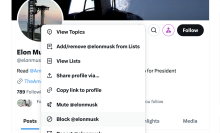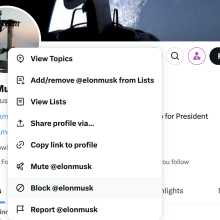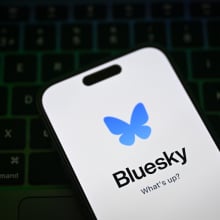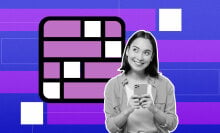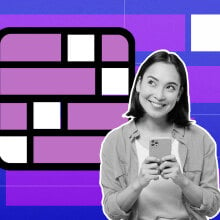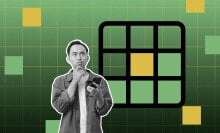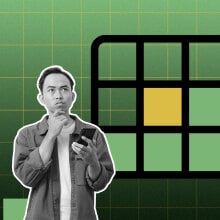On May 6, celebrities flocked to the steps of New York's Metropolitan Museum of Art, swathed in jewelry and fineries, as hundreds of pro-Palestine activists protested just miles away. That same night, Israeli airstrikes targeted Rafah, an enclave on the border of the Gaza Strip that was instrumental for transporting aid and supplies, and a refuge for Palestinians amid the ongoing war.
In the wake of these events, a digital movement took flight.
Labelled "celebrity blockout 2024" and "digitine" (or the "digital guillotine"), the movement is a protest against celebrity culture: specifically, blocking people of influence who have not yet used their power or privilege to take a stance on the humanitarian crisis that has devastated millions.
What is the celebrity blockout 2024?
At the time of the Met Gala, social media users began drawing comparisons to The Hunger Games, Suzanne Collins' dystopian YA franchise that unpacks themes of class, survival, and privilege. On X (formerly Twitter), people used the series to flag the painful gap between the opulence of events like the Met Gala and the war in the Middle East that continues to take lives. Images of Met Gala co-chair Zendaya, juxtaposed with photographs of Palestinian children in Rafah, enraged the timeline when posted together.
These notions quickly transformed into a larger call to action, which has become the blockout movement.
Hashtags ranging from #celebrityblocklist, #letthemeatcake and #blockout2024 are being used to galvanize people in the online boycott, which is targeting some of the world's most recognizable faces, from the Kardashians to Zendaya to Taylor Swift.
It also takes aim at influencers. Much of the movement began with reactions to an ill-advised video from influencer Hayley "Baylee" Kalil (@haleyybaylee) who posted a video of herself at a Met Gala pre-event, lip-syncing to the alleged Marie-Antoinette quote, "Let them eat cake," which appeared in Sofia Coppola's 2006 biopic of the French queen. Though there's no historical evidence Marie-Antoinette actually said it, the quote is indicative of the struggles during the French Revolution, when the bankrupt aristocracy was overthrown after a movement spearheaded by those suffering from social and financial inequality. King Louis XVI and Marie-Antoinette's extravagant spending and corruption within their powerful court was a point of contention for the people, whose economic interests were being dismissed and lives were increasingly poverty-stricken.
TikTok user Rae (@ladyfromtheoutside) has been attributed the kickoff to the movement, specifically using the term "digital guillotine" or "digitine" and asking for TikTok users to begin by unfollowing Baylee in particular. The "guillotine" reference points to Baylee's use of the infamous Marie-Antoinette quote, as both Louis XVI and the Queen were executed by guillotine after the revolution prevailed.
"We gave them their platforms. It's time to take it back, take our views away, our likes, our comments, our money," stated Rae, in a video that garnered over two million views.
What is the movement asking for?
Across social media, including TikTok and X, people are posting lists of celebrities to unfollow or block en mass, on the basis that these public figures are both out of touch and not using their immense and wide-reaching platforms for good.
Tweet may have been deleted
TikTokkers have explained that the movement is about the overwhelming silence from public figures, about celebrities recognizing their reach, and people redirecting their money and attention from these faces. Media outlets like Slow Factory have explained that the digital revolt is all the more impactful because people are not only removing celebrities from their feeds, but actually blocking them, thereby removing their monetary gains from targeted ads: "This is a grassroots push for accountability and social responsibility from all members of the community, celebrity or not," reads an Instagram post from the company.
Others participating in the movement have also have pointed out that disillusionment with celebrities in the midst of world crises is nothing new, and that the pro-Palestine movement is largely being propelled and given voice by the people — those on the ground, working to make change.
"Why is it that we are more invested in a small blip from a celebrity?," asks creator @ashcashistrash. "I do not care if Kim Kardashian has a fucking thing to say about it. I care about the people who are on the ground suffering, the people who have educated themselves here in America, who are protesting. I do not care about celebrities and you shouldn't either."
Mashable's Elena Cavender and Chase DiBenedetto argue similarly, writing, "Why are we so obsessed with what celebrities think of social movements?" While celebrities have the means to direct attention towards Palestine, they wrote, "it's up to those online to choose where to focus their eyes."
Tweet may have been deleted
This sentiment is echoed by other TikTokkers, like @xiandivyne, who argues that the digital boycott has the potential to be punitive, and moreover, may not have a clear aim, while the continuous student protests across campuses worldwide do.
Tweet may have been deleted
Still, a significant amount of traction has since led to famous figures reportedly losing hundreds of thousands of followers, including Selena Gomez, Kim Kardashian, Kylie Jenner, and Zendaya. Meanwhile, singer Lizzo spoke out just yesterday, in an Instagram post that she called "long overdue", specifically thanking the activists "working tirelessly to help the liberation" of people in Palestine, Sudan, and the Democratic Republic of Congo, where humanitarian issues and conflicts are reaching new heights.
Criticism of the blockout suggests that the pedestal of celebrity is not necessarily what activism needs, while others have denoted that the movement is a culmination of frustration and anger toward public figures, their apparent ignorance, and resounding silence. It's this silence that is ultimately being panned, whether or not we need celebrities and their words to create significant change. And the real win comes with a concrete effort to direct collective energy towards others: activists, small businesses, and those who have long been speaking out in all forms.


